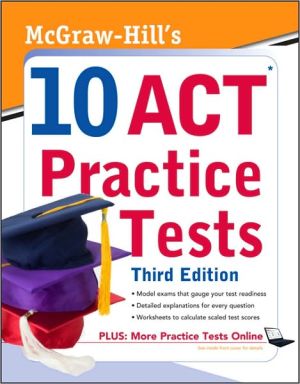ACT for Dummies
Boost your test-taking skills and beat the clock\ Prepare for the ACT? quickly and painlessly and maximize your score!\ Are you one of the millions of students taking the ACT? Have no fear! This friendly guide gives you the competitive edge by fully preparing you for every section of the ACT, including the optional writing test. You get two complete practice tests plus sample questions — all updated — along with proven test-taking strategies to improve your score.\ Discover how to\ * Study...
Search in google:
Boost your test-taking skills and beat the clock Prepare for the ACT? quickly and painlessly and maximize your score! Are you one of the millions of students taking the ACT? Have no fear! This friendly guide gives you the competitive edge by fully preparing you for every section of the ACT, including the optional writing test. You get two complete practice tests plus sample questions — all updated — along with proven test-taking strategies to improve your score. Discover how to * Study for each section * Stay focused during the test * Manage your time wisely * Make smart guesses * Spot test traps and tricks
The ACT For Dummies\ \ By Michelle Gilman \ John Wiley & Sons\ ISBN: 0-7645-9652-7 \ \ \ Chapter One\ ACT Write: The First Words on Essay Writing\ In This Chapter\ * Learning the ten major writing errors to avoid in your writing\ * Understanding the ACT scoring system\ * Viewing sample essays\ The writing portion of the ACT is optional, meaning you have the choice of spending an extra 30 minutes at the testing center (How lucky for you!). Although it's optional, three-quarters of the colleges and universities require this section of the ACT, so it's in your best interest to take this section. Taking this part of the test and assuming your college is going to require it is better than not having a score to submit. In other words, take the darn test. You have nothing to lose if your university doesn't want it, and everything to lose if it does. In this chapter you'll find out about frequent pitfalls you can expect in writing and what scoring system the ACT people use, and you'll read sample essays that have received scores ranging from one to six.\ If you're already an excellent writer, which most of you probably are, this chapter gives you the added confidence you need to understand the ACT essay. If you're not the greatest writer, as many students are not, don't despair. That's what we're here for. This chapter teaches you the writing skills and builds up your confidence so you can use them! Seeing how other people have done it makes beginningto write easier. As a result, we included sample essays with low scores for you to laugh at (don't worry, we don't include their names) and essays with high scores for you to learn from. Generally, test-takers are provided with a point-counterpoint topic and asked to write about one side or the other. For information on how the essay test is administered, see Chapter 8.\ Rattle Your Writing with Some Loose Screws\ Relax. You've been writing since first grade, you have something to say, and this test is a way to prove that. All you need is a quick refresher. Although you may be scared to death of putting your ideas on paper with your name clearly indicated at the top (ooooohh, how we hate to be judged), relax, your name is only on the first page and the ACT scoring folks don't know what you look like. Before you start, though, here are some things to consider and remember to keep you from making the most common mistakes in essay writing. Keep these things in mind, and you'll write the best darn essay ever.\ We know you can do it. Here we go ...\ Thought diarrhea: Writing before you think\ If you have no destination, you're bound to get lost. The most important part of your essay is having structure and a clear idea of where you're going. If you put your pen to the paper without knowing what the heck you're going to say, you can bet your bottom dollar that the ACT folks won't know what you're saying either. Plan, plan, plan. Thought diarrhea, or writing just to be writing, leads to loose essays, and no one wants to read that mess. Besides that kind of running off at the ink pen makes your writing stink. Creating a solid essay that has a clear organizational plan, however, will get you a high score.\ The attack of the clock: Panicking about time\ Writer's block, when you simply can't think of anything to put down, often occurs in stressful situations and frequently is caused by a time crunch. You have 30 full minutes to complete the writing portion of the ACT. That's plenty of time to read the question, organize your thoughts, write, and do a quick edit. We suggest that taking 2 minutes to read the question, 3 minutes to write your thesis and hook, 5 minutes to organize your thoughts, 17 minutes to write, and 3 minutes to edit and proofread is an easy breakdown of the 30 minutes. Panicking takes 30 minutes just to get over, and by then, your time's up!\ Being too relaxed: Not noticing your time limit\ Be aware of your time but don't panic. We know, that's easier said than done. But remember that the ACT people know that you don't have enough time to write the great American novel. However, they expect you to produce a good, concise essay in the time that's allotted. It's important for you to start right away, use your time wisely, and stick to the time schedule. You won't have any time for deep, inner reflection, so don't waste it. You have a time limit; stick to it.\ Expressing your inner poet: Using creativity as a crutch\ College admissions offices are looking for your creative individualism, but the folks at the ACT are looking for an essay. The ACT writing test gives you a prompt, or topic, to write about. It is very specific, but it isn't the time to write a novel, a journal entry, or a poem. Although you may think you're being creative and impressive, the real creativity lies in impressing them with your writing skills. The ACT writing test is the time to conform to the model of what the test-makers want (which is an organized, thought-out essay that answers the question that they originally asked you), but you still can throw a dose of you into the essay by using unique examples. The structure and the language of the essay need not be in a creative format. Do what the test-makers want, so you get the score you want.\ Big words with big consequences: Using words you don't know\ Nobody can be Shakespeare, especially in 30 minutes, not even Bill himself. When writing the ACT, you won't have the thesaurus button on your word processor in front of you. The worst thing you can do is use words that you think sound good, but you're not really sure what they mean. Instead of trying to use words that you don't know, impress the ACT readers with your thoughts and your ability to communicate clearly. Using words you don't know or quite understand, may give the ACT graders a laugh, but you won't be laughing when you see your score.\ Expecting perfection in 30 minutes: Being overcritical of yourself\ Nobody writes the perfect essay in 30 minutes. Nobody! The graders know that. Trying to be obsessively perfect does you more harm than good. If you spend too much time critiquing yourself, the ACT graders won't have anything to critique. You still can get a perfect score in 30 minutes, if you follow the suggestions and format in this book. Watch your time, stay organized, express yourself clearly (and in your own words) and you can get the perfect score, even though you can do better when given more time.\ Speaking another language: Dude, they want to read English\ We all know that speaking is much easier than writing. However, this test is neither the time nor the place to impress the test-makers with your street vocabulary, dude. Whatever you do, don't drop it like it's hot, don't think you're too cool for school, don't think you're kinda-like the, like, greatest, or like "ohmygod" this is so cool, or else it's your bad. In other words, you're not I'ming, you're not talking to your best friends, and you're not trying to communicate on the playground. You are writing for a bunch of old fogies who have no idea what the latest slang means, dude. (By the way, don't ever use "dude" in your essay, dude.) Make sure that you're using words that your grandparents understand.\ Being a wimp: Not taking a solid stand\ Our definition of wimp is being indecisive. If you don't take a solid position with your writing, you're going to get knocked down by the graders. You may read a question and think you can justify it in a few different ways, but nobody ever plays for two opposing teams. Don't be scared of picking a side even though you don't believe it. Sometimes you have to lie. The ACT people won't know that you're lying. They only care that you sound confident and that you can support yourself. Choose your thesis based on the amount of ideas you have to back it up, and your solid thesis and back-up punches will give you a winning score.\ You are not an island: Forgetting that people really read this stuff\ The weekend before the ACT, you may be picketing your local politician, participating in a hunger strike for the dying kids in Africa, or living in the trees to save the forests from corporate logging. However, the ACT essay is not a forum for political activism. Remember, the people who score your essay come from all walks of life. You don't want to become too controversial and risk angering the reader so that it can affect your score. Remember that real people are reading your essay from their points of view and your score may reflect their counterviews. Steer clear of controversy.\ Do not do not repeat yourself: 'nuff said\ One of the biggest mistakes that you can make on the ACT writing test is saying the same thing again and again in different words. Don't try to lengthen your essay by repeating yourself. The test-graders got it at the first sentence. If you find yourself repeating sentences for lack of things to say, then you've chosen the wrong topic. The way to avoid this mistake is by organizing your thoughts and coming up with specific and different examples to prove your thesis before writing your essay.\ Leaving the bathroom with TP on your shoe: Not editing your essay\ The most embarrassing thing that can happen to you on that perfect first date is your date noticing that you have toilet paper sticking to your shoe. Date over. To counteract potential faux pas like that, make sure that you double-check you shoes before leaving the bathroom - hence a skill that can be applied to your ACT writing. (At last, a real-world skill you can finally use.) Leave yourself time to proofread and check your essay for any obvious sentence structure errors, spelling mistakes, lack of clarity, punctuation, repetition, and illegible handwriting. It helps you to avoid veritable TP that's stuck to your writing. Proofreading and editing are the essential double-checking that you need to do before you walk out the door.\ Making the Grade: How the ACT Folks Are Going to Score You\ You'll be happy to know that you personally receive not one, but two, yes two, trained readers who will score your essay. And it gets better ... if the first two don't agree, you personally receive a third, yes third, reader all to yourself. Aren't you special? The ACT guys sure think you are. Not only will you be fortunate enough to receive a numerical score, you even have the pleasure of reading the graders' individual comments on your writing. And yes, those comments appear on your high school and college reports. So, we better get cracking....\ Here's the skinny on the scoring:\ Two readers read your essay and each assigns a numerical grade from 1 to 6. The sum of those ratings is a student's Writing Test Subscore (2 to 12). If you take the writing test, the ACT people report the score as a Combined English/Writing Score. The English test contributes two-thirds and the writing test contributes one-third toward the combined English/ Writing score. If you choose not to take this writing test, your score is reported only as the English subscore. The absence of the writing test score won't affect your score in any other area.\ Example Essays and Their Scores\ The ACT essay is scored from one to six. One is the lowest score you can achieve, and a six is the highest score. One of the best ways to avoid the common mistakes associated with receiving the lower scores is to read examples of all possible grades. After reading the examples we've created, you will have a much better idea what to avoid in your writing. This next section explains what it takes to get the highest possible scores on your essay. You also get a chance to see samples of each scored essay so that you're better prepared. Feel free to laugh at the ones with lower scores. We did.\ The ACT gives you a long-winded prompt for you to write about. Here's the prompt and six sample essays:\ Example Prompt\ In some high schools, many teachers and parents have encouraged the school to adopt a dress code that sets guidelines for what students can wear in the school building. Some teachers and parents support a dress code because they think it will improve the learning environment in the school. Other teachers and parents do not support a dress code because they think it restricts the individual student's freedom of expression. In your opinion, should high schools adopt dress codes for students?\ In your essay, take a position on the question. You may write about either one of the two points of view given, or you may present a different point of view on this question. Use specific reasons and examples to support your position.\ TIP\ Remember it doesn't matter which side you choose to write about. Picking one or the other won't matter in the ACT graders' eyes. All that matters is that you pick one side and support your opinion.\ 1 - 1 is the loneliest number: How not to be a 1\ I think students should have a dress code. There is a lot of gangsters at my school that where there pants to low and I don't really like it. If we had a dress code they wouldn't be allowed to do it. Girls should be able to wear shirts that show their stomach though since it looks good and everyone else likes it. There should also be a dress code for really stupid fashion. This should be imposed on teachers too. And principles. I think this is only fair. Why should we have to be the only ones who who have to have a dress code.\ Being number 1 may be great for high school football, but it isn't great on your ACT test. This writer answered the question and chooses a side, but she did not support or back up her statement. Not only does she not support herself, she goes off on a tangent and wanders throughout the essay. Her lack of focus, irreverent examples, and her manner or writing like she speaks is going to get her a 1 on the test. Oh, and by the way, the number of spelling and word errors takes away from her ideas, is distracting, and definitely influences the way the graders look at her paper.\ 2 - 2 little 2 late: Steer clear of coming in second\ I don't agree with the teachers and parents who think we should have a dress code. Our style of dress is what makes us individuals and sets us apart form each other.\ At my school students who dress in certain ways find others who are like them. You always know who is interested in the same stuff as you by what they wear. Imposing a dress code doesn't allow us to make friendships with people you are like ourselves.\ Uniforms would make people mad. Teachers would find it hard to control all their students because students would want to rebel. Kids wouldn't be able to find friends who are like them and this would cause them to rebel.\ These are just a few reasons why we should not have a dress code at school. There are many more reasons then just these but these are the most important.\ To ACT graders, a 2 means you show weak skill in writing the essay. At least they're saying you have some sort of skill, but it can be improved. This writer answers the question and shows that he can support his point of view, but his lack of organization leaves readers' heads spinning. The writer has paragraph structure in this essay, with clear indentations, an introductory paragraph and conclusion, but transitioning between the two paragraphs is missing. His simple sentence structures let everyone know that his writing skill may not be as high as it should be. A 2 may be better than a 1, but it isn't a score for which you should strive.\ (Continues...)\ \ \ \ \ Excerpted from The ACT For Dummies by Michelle Gilman Excerpted by permission.\ All rights reserved. No part of this excerpt may be reproduced or reprinted without permission in writing from the publisher.\ Excerpts are provided by Dial-A-Book Inc. solely for the personal use of visitors to this web site. \ \
Introduction. Part I: Coming to Terms with Reality: An Overview of the ACT. Chapter 1: Getting Your ACT Together: The Format. Chapter 2: Succeeding on the ACT. Chapter 3: Reading the Admissions Committee’s Mind: What Colleges Want. Part II: Serving Your “Sentence”: English Review and Test. Chapter 4: Glamour Grammar: The Five-Star Review. Chapter 5: Misspellers of the World, Untie! Mastering the English Test. Chapter 6: It’s Not What You Say, It’s How You Say It: English Practice Questions. Part III: Writing the Writing Test Rightly: You Have a Choice. Chapter 7: ACT Write: The First Words on Essay Writing. Chapter 8: Write Right: The Writing Test Review. Chapter 9: Practicing Promptly with Practice Prompts: Essay Practice Examples. Part IV: Don’t Count Yourself Out: The Math Review and Mini-Test. Chapter 10: Ogling More Figures than a Beauty Pageant Judge: Geometry Review. Chapter 11: Catching Some (X’s, Y’s, and) Z’s: Algebra and Other Sleeping Aids. Chapter 12: Reviewing Miscellaneous Math You Probably Already Know. Chapter 13: Numb and Number: Acing the Mathematics Test. Chapter 14: More Fun Than a Root Canal: Mathematics Practice Questions. Part V: Time to Read the Riot ACT: The Reading Test. Chapter 15: This, Too, Shall Pass(age): Sailing through the Reading Test .......................................145 Chapter 16: Where AreCliffsNotes When You Need Them? Reading Practice Questions..............151 Part VI: Proven to Cause Brain Defects in Laboratory Rats: The Science Reasoning Test. Chapter 17: Frankenstein to Einstein: Excelling on the Science Reasoning Test. Chapter 18: Faking Atomic Ache Won’t Get You Out of This: Science Practice Questions. Part VII: I’d Rather Wait for the Movie: Full-Length Practice ACTs. Chapter 19: How to Ruin a Perfectly Good Day, Part I: Practice Exam 1. Chapter 20: Practice Exam 1: Answers and Explanations. Chapter 21: How to Ruin a Perfectly Good Day, Part II: Practice Exam 2. Chapter 22: Practice Exam 2: Answers and Explanations. Part VIII: The Part of Tens. Chapter 23: Ten Wrong Rumors About the ACT. Chapter 24: Ten Differences between the ACT and the SAT. Index.
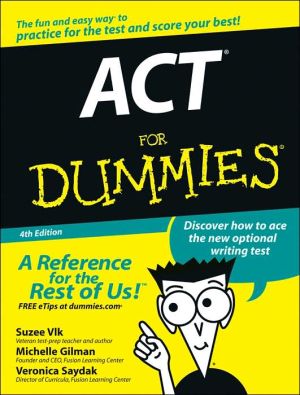
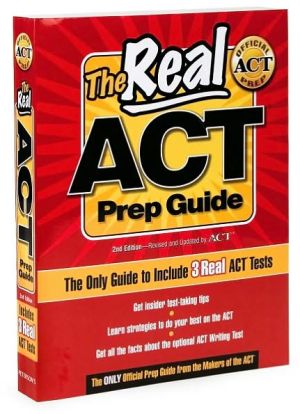
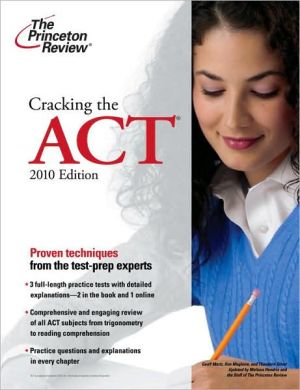
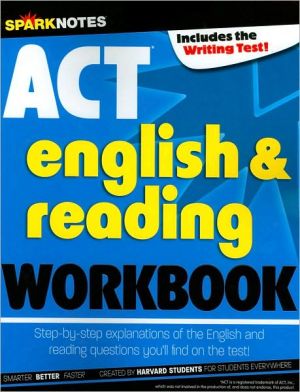
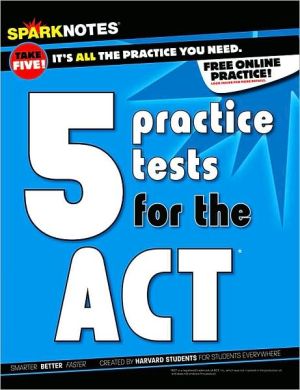
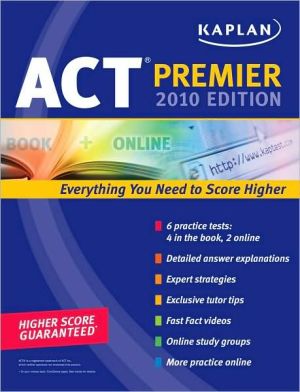
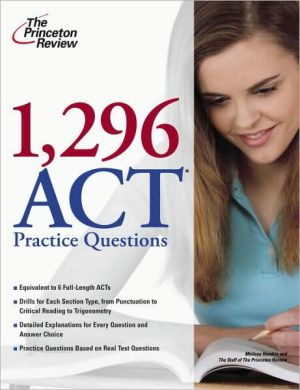
![The Real ACT Prep Guide [With CDROM] The Real ACT Prep Guide [With CDROM]](/application/data/covers/14/02/9780768931402.jpg)
